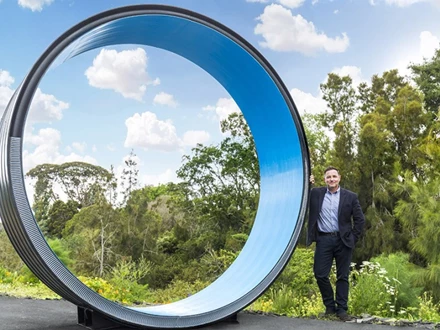Over the past year Solo Plastics has been testing technology to make plastic pipes out of recycled milk bottles. Those trials have been so successful that it has invested in new high-tech equipment from Germany that can produce pipes on a massive scale. CEO Alan Sutcliffe is confident the plant will be up and running in a new East Tamaki factory by the middle of this year.
Solo Plastics has been in business for more than 35 years, designing, building and installing plastic piping solutions for infrastructure in New Zealand.
The business changed hands two years ago and developed a vision for "fabricating for a better tomorrow". Alan says that means working “to protect our people and our planet by applying truly sustainable manufacturing”.
The business has always recycled its own high density polyethylene (HDPE) offcuts and waste and collects HDPE waste from some of the sites it works on. It has also started a product stewardship trial collecting waste HDPE piping from electrical merchants.
Last year Solo Plastics recycled 71.3 tonnes of plastic waste. That may sound like a lot but it’s only a fraction of the amount used in production every year.
“New Zealand imports thousands of tonnes of HDPE resin from all over the world to make pipes while at the same time we’re exporting waste plastic milk bottles abroad for recycling. We’re trying to flip that on its head by importing less and using more locally,” says Alan.
It turns out that our plastic milk bottles - the ones with the #2 recycling symbol – are a large and valuable local resource.
“We’ve found the quality of milk bottles in New Zealand is extremely good, and we’re getting really good results with it.”
A WasteMINZ report released in January 2020 reveals that more than 7,800 tonnes of #2 dairy containers, including milk bottles, are collected for recycling every year in New Zealand. Sadly, more than 1,700 tonnes are still being sent directly to landfill.
At this point it’s hard to estimate how many recycled milk bottles Solo Plastics will be able to use, but it’s going to add up to millions over the next few years. To give you an idea, it takes more than 3000 two-litre milk bottles to make a standard six-metre length of pipe with a diameter of 800mm. At that rate, says Alan, getting enough bottles could be an issue.
“We’re also doing trials using a mix of milk bottles and other HDPE plastics like shampoo and detergent bottles and the results we’re getting are encouraging.”
This NZ based processing and market development of recycled materials provides further local product stewardship options for suppliers of packaged goods to economically manage the end of life of their packaging.
The bottles are processed by Astron, in Auckland, which turns them into tiny pellets of plastic resin. The resin can be used in a number of ways, including extrusion and injection moulding.
Solo Plastics uses a method called ‘spiral wound’ extrusion. Rather than producing products made out of solid plastic, this latest technology uses lightweight spiral wound hollow cores around an inner core. This creates a product that’s incredibly strong without being heavy. That’s a big plus when you’re producing pipes, up to five metres in diameter, as it makes them easier to handle, transport and install.
“They can be built to withstand the same loading and will last as long as concrete, which used to be the only option but is not a very sustainable product.”
Alan says recent studies have compared the emissions created when producing large diameter pipes using concrete and HDPE.
“It was found that, on average, concrete produced 21% more emissions during production and 95% more emissions when transported from the factory to work site.”
The new equipment on the way from Germany will make pipes out of virgin or recycled HDPE.
Premium grade pipes for big infrastructure projects will continue to be made out of virgin resources. Pipes that don’t need the same high level of structural integrity, as used on farms on forestry for culverts and waste water, can be made out of recycled material.
Alan says that in terms of a circular economy the milk bottle project is a beautiful fit.
"We’re recycling milk bottles so they can be used to drain the farms that produced the milk in the first place. And, in a 100 years’ time those pipes can be dug up and recycled all over again.”
Photo: Solo Plastics CEO Alan Sutcliffe

